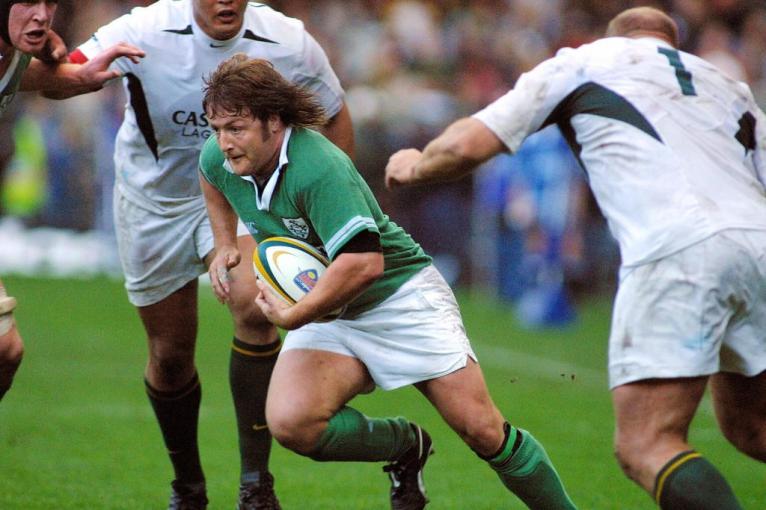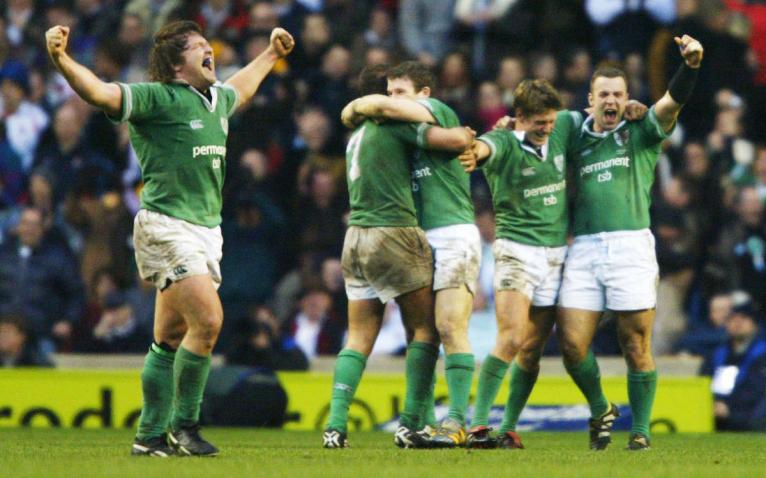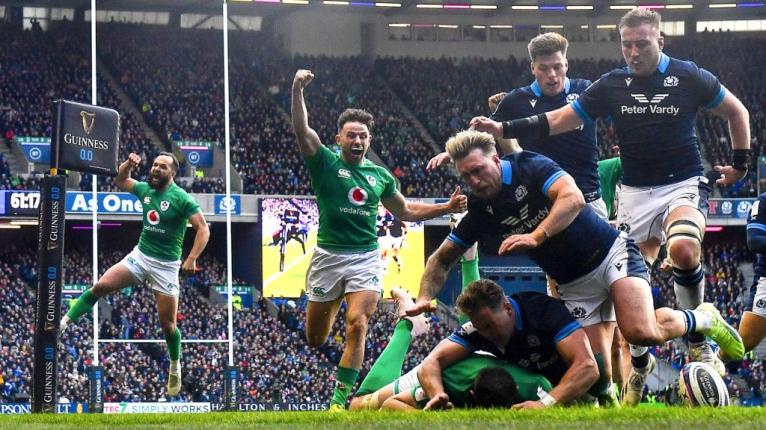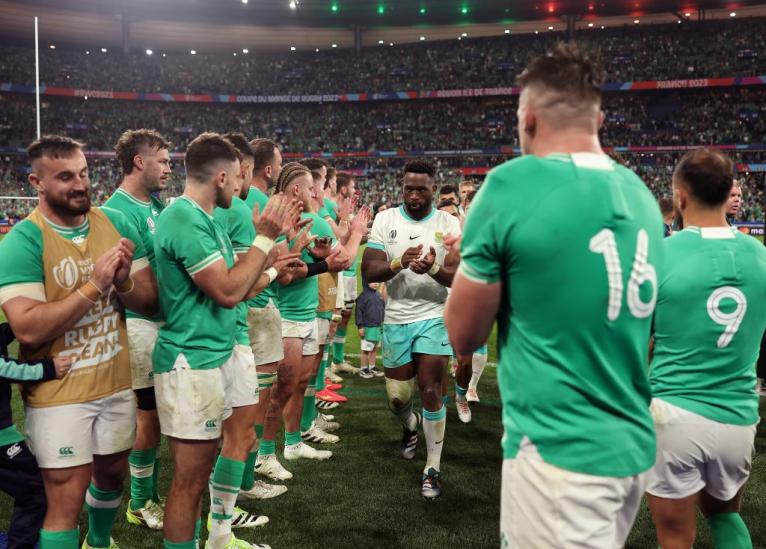It is an old story but worth retelling.
Shane Byrne was a young man then, brimful of confidence, thrilled to be called into his first Five Nations squad. The year was 1995; the city, Cardiff; the scene, a pavement outside the airport terminal. So far, so normal as four coaches pulled up to bring the travelling party to the team hotel. The alickadoos (IRFU officials) and their wives boarded the first three of those coaches whereas the players were forced to wait around for the last one before exiting the airport. Not a word was said yet the hierarchy had spoken.
It seems the perfect metaphor because 1995 was when rugby turned professional. Yet Ireland initially missed the bus, the 1990s being the team’s worst decade. Namibia beat them twice, Samoa once, Italy three times in three years. France? Ireland played Les Bleus 11 times in that decade – and lost all 11. England? Ten games, eight wins for England, two for Ireland.
South Africa, Australia and New Zealand? Disaster mixed with the odd near miss.
And then there was Scotland. Two countries with similar playing populations met 11 times in the 90s. Scotland won ten of those matches, drawing the other.
So, that’s one very good reason why the 41-cap hooker, a Test starter on the 2005 Lions tour, is reluctant to start talking about Ireland advancing to the World Cup quarter-finals just yet. Scotland, he argues, are an exceptional side. A win for them this Saturday, while denying Ireland a bonus point, would send Ireland home. Nothing can be taken for granted.
“I know what can go wrong,” Byrne said.
When it comes to Ireland, and World Cups, almost everything can.

Here’s another quick history lesson. In 1987, Ireland were Wales’ masters in the Five Nations. Two months later, Wales beat them in the World Cup pool stage, en route to their first semi-final. Ireland crashed out in the quarters.
That was where they were again in 1991. Australia were the opponents that day. Ireland led with three minutes to go. Yet still they lost. In 1995, Byrne’s first World Cup, they had France tied up in knots in the first-half before running out of steam in the second. Come 2003, Byrne’s last World Cup, France again were too good, just as they were in 2007, as Argentina were against Ireland that same year, as well as in 1999 and 2015, as New Zealand proved to be in 2019 and Wales in 2011.
“The quarter-final hoodoo is the worry,” Byrne says. “This is our tenth World Cup. We have lost seven quarter-finals, one preliminary quarter-final and then, in 2007, we didn’t even get out of the pool.
“I’ve suffered bad experiences myself in 2003 and 1995. I’ve seen a really good Ireland team, one with Brian O’Driscoll, Johnny (Sexton) and Paul O’Connell in it, top their pool and then lose to Wales in the 2011 quarter-finals. My point is, we need to think one game at a time, this time. I know it is a cliché. But with our World Cup record, we can’t look further down the road.”
Rugby has its knockers in Ireland but the majority of Irish people are sports mad and just want to see their country do well. We hope this can be a special time.
Try telling Irish fans that.
The win, 10 days ago, over South Africa was watched by the biggest TV audience of the year in Ireland, the largest sporting audience for any game in nearly two decades.
Rugby has become chic and for a rugby man like Byrne, someone who admits to being terrible when he first picked up a ball, who was on his school’s Under 13 Barbarians team, which was the diplomatic term they gave the seventh-best team in that age grade, the increased popularity of his sport is good for the soul.
“Rugby has its knockers in Ireland but the majority of Irish people are sports mad and just want to see their country do well,” he said. “We hope this can be a special time.”
Hope is one thing, belief another.

And herein likes the crunch. Ireland have always been psychologically fragile in World Cups. Kings of November internationals, they may be, but when it comes to the big show, they have been found wanting.
So Byrne is conflicted, one moment cautious, the next optimistic, preferring to deal with hard facts.
“There is no team in the world Ireland cannot beat,” he says.
“Nobody wants to meet us at this point because what we showed against South Africa is that we are a ridiculously hard team to beat. That was a titanic clash and it’s ridiculous to think it was a pool match, a game of that quality. That was good enough to be a final.
For me, getting the mindset right is the biggest challenge facing Andy Farrell now. Scotland is a banana skin.
“It is ridiculous that Ireland, South Africa, France and New Zealand could all meet in the quarter-finals, and that two of them will be gone, harsh that a team as good as Scotland may not make it out of their pool. Perhaps Ireland mightn’t, either.
“For me, getting the mindset right is the biggest challenge facing Andy Farrell now. Scotland is a banana skin. If Ireland top their pool and meet the All Blacks in the quarters, that’s more than a banana skin. Say, we got to the semis, then met Wales, we just have to remember 2011 and what happened when we met then.
“That’s why we can’t look further ahead than Saturday. Scotland are strong. There are no guarantees.”

And yet for all the Byrne diplomacy, some factors cannot be ignored. First, it’s true, Scotland are an impressive team; but Ireland are a better one. You have to go back to 2017 for the last time Ireland lost to the Scots. Their head-to-head record in the 90s was poor, but since then they have bossed the rivalry.
So let’s ignore ancient history for a second and look at modern history. Ireland haven’t lost to anyone since Eden Park, 17 months ago. They have defeated the All Blacks, England and South Africa twice each since then, as well as France, Australia, Wales and, eh, Scotland.
“I like what I am hearing from this Ireland squad,” says Byrne. “After the win over Tonga, Tadhg Beirne made the point that they are playing knockout rugby now. And that was good to hear.
The fact we are even in a position to talk about us as realistic contenders to become world champions is absolutely amazing.
“This is a squad with depth, and providing there isn’t (injury) devastation in some game, our squad should be strong enough to get us through. The fact we are even in a position to talk about us as realistic contenders to become world champions is absolutely amazing.”
The reason he says this has a lot to do with his own journey.
When he finally made his international debut, it was after a decade in sporting purgatory.
He’d first been called into an Ireland squad in 1993, first toured with them in 1994, travelled for that Wales game in 1995. But each time he was left on the bench.
Hookers came and went. Steve Smyth, John McDonald, Allen Clarke, Terry Kingston, Ross Nesdale.
Keith Wood stayed the course. And so did Byrne. He was on the Ireland B squad before they changed the name to A internationals and over the years he wore out all the half-forgotten towns on the dirt-track circuit: Mount Isa, Lismore, Pontypridd, Ebbw Vale, Ayr, Newport, Quimper.
Blackrock and Leinster were his sanctuaries when times got tough and self-pity took a hold. One of his old coaches, Joe McDonald, took him aside, offering therapy. “I’m thinking of jacking it in, it’s really getting to me, I’ll never get that cap,” Byrne told him.

McDonald listened, looked at him but didn’t exactly give him a cuddle. If you give up, you definitely won’t get a cap, he told Byrne. So keep going.
He did. And in 2001, on the edge of the rugby world, in Dinamo Stadion, Bucharest, he finally got what he wanted. Romania versus Ireland, 1,900 people there to watch him play for Ireland. There will be 50,000 Irish people travelling to Paris this weekend.
“To see what our sport has become in Ireland is great,” he says.
“It has been a heck of a journey over a long number of years. Big wins – France away in 2000, Australia in 2002 (he played that day), South Africa in 2004, England in 2004, the grand slam in 2009, the win in Chicago against New Zealand in 2016 – they’ve been landmarks. But the World Cup is the big one.”
That journey isn’t ready to end this weekend.


But so can Ang team win you in the day. Especially in world cups that is the theatre stage for union. Don't ever underestimate teams again
History never wins battles. Troops win battles, accompanied by a better battle plan than your enemy, who use their resources well and a usually have a better commander.
Apply that to New Zealand v Ireland.
Front Row Ireland -Win
Locks New Zealand - Win
Loose Forwards Ireland -Win
Backs New Zealand - Win
Coach - Ireland Win
So really the coach is the difference. Do any of us really think the current All Blacks believe in FOSTER. . . because if they do they are stupid, They aren't stupid.
If you All Blacks "Run the ball all day they can win on 30% of Possession against Ireland"
Will I back them, not with "Stolen Money" Can you imagine them taking this game into their own hands. . . No! . . . maybe?. . I just think they haven't got the balls to "Defy" FOSTER and NZRFU. . . But just maybe they might. Wouldn't that be great!
Revolution is exciting and maybe just what's needed to ignite these guys.
Mind you most of you will never play another World Cup. . .
Maybe you may "realise. . .It's never too late to change. . . If you can keep doing what you have been doing, you will get the same result OR
F. . . . FOSTER and the NZRFU who "Sold you to "ALTRAD" and "Silver Lakes"
A corrupt "Arab" and a bunch of Yankee Billionaires and a slippery CEO Mark Robinson.
Take "Control" SAM, I don't care which SAM. . . ,.give yourself a chance.
Battles have been WON with a change of thinking in the last hour.
Until you take "Control of your own destiny" you will always wonder "What If"
'What have you got to lose"?
"Stand up, be counted, your life, not Foster's or The School Teacher's"
Although Ireland need to improve at knock out matches I don't think all of their exits were due to being fragile. In 2011 we had a good team but Wales were clearly better and but for a red card in the Semis could have become champions.
In 2015 Argentina were better. We had a brutal match with France the week before with a lot of injuries but you get that from inaccurate play. Exits from France, Wales, Argentina and New Zealand (since Ireland improved in the early 2000s) are not shameful. We may play our best game ever and still be eliminated in a QTR in 2023.